Since the U.S. President joined this trend, it marks at least five leaders involved in the memecoin farce.
Written by: Ailsa Sherrington, CoinTelegraph
Translated by: Tao Zhu, Jinse Finance
Since U.S. President Donald Trump launched his iconic memecoin TRUMP on January 18, at least five senior politicians have been involved in fraudulent or poorly executed token launches—an alarming number in just one month.
Notably, Argentine President Javier Milei's involvement with the LIBRA token is particularly concerning. According to Nansen, over 13,000 investors collectively lost $251 million. In contrast, the so-called "pump" activity only allowed 2,101 investors to gain a total of $180 million.
Scammers have repeatedly attempted to profit from the memecoin craze initiated by the U.S. President by using the images of other puppets—from Saudi Arabia to Malaysia.
Here are some memecoin scandals involving leaders since Trump.
February 10—Central African Republic Token CAR
The President of the Central African Republic launched the national token CAR on February 10, apparently to bring prosperity to the nation. However, the clumsy manner of its release raised questions about its legitimacy.
President Faustin-Archange Touadéra promoted the memecoin through his verified X account—but shortly after, the project's website was taken down, and his X account was suspended.
After several hours of silence, Touadéra made a strange decision to launch a new website and X account, which intensified doubts about its authenticity. These concerns were supported by a video released from Touadéra's account, which triggered warning signals when run through deepfake detection tools.
However, a video later released by the president did not raise these alarms.
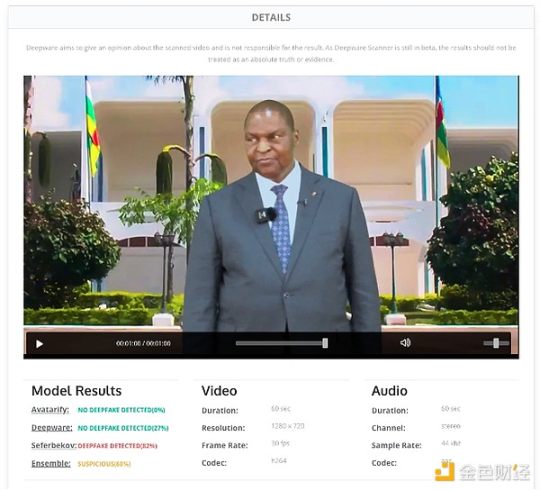
Two models flagged a video of Touadéra as potentially AI-generated. Source: Deepware
Speculators were unable to determine whether CAR was real. Many warned X users not to invest, just in case. Ultimately, the embarrassing release was enough to cause CAR's market cap to plummet from $600 million to nearly $0 within two days.
February 14—The "Libragate" Drama Begins
The LIBRA token is the most famous example of leaders getting involved in memecoin scandals since Trump. According to Nansen, 86% of traders lost over $1,000 by investing in the token promoted by Argentine President Javier Milei—meaning over 13,000 investors collectively lost $251 million.
On February 14, Milei enthusiastically posted about LIBRA, claiming the project's intent was to "fund small businesses and startups in Argentina." His now-deleted post, along with posts from several Argentine politicians, lent credibility to the memecoin.
LIBRA once surged to $4 before rapidly crashing. The next day, Milei stated that he "did not know the details of the project" and that upon learning of it, he "decided not to continue promoting the project."
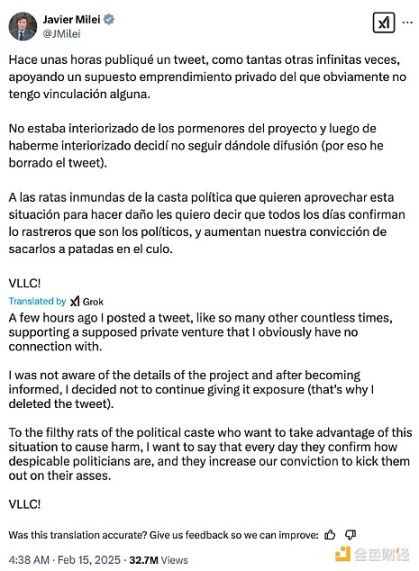
However, shortly after, contradictory statements emerged. Milei quickly refuted allegations that he had been involved since the project's inception, as well as potential impeachment and fraud accusations. These allegations are still ongoing.
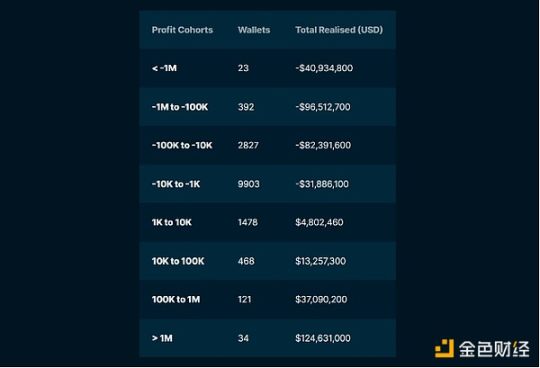
Look at all the winners and losers of LIBRA. Source: Nansen
February 15—"Bermuda National Coin"
As early as February 2, Bermuda Prime Minister David Burt was impersonated by an X user. Scammers used his image to create a fake account that somehow obtained a gray verification badge—typically reserved for government officials. Burt's real account had not even received this badge.
The scam account began promoting a token called "Bermuda National Coin" on Pump.fun on February 15. The real Prime Minister became aware of the impersonation the day before; he tagged X and its owner Elon Musk in a post, urging them to address the issue.
"Not sure how they got the gray verification badge, but due to the lack of control on this app, people will get scammed. Please fix it," the post read.
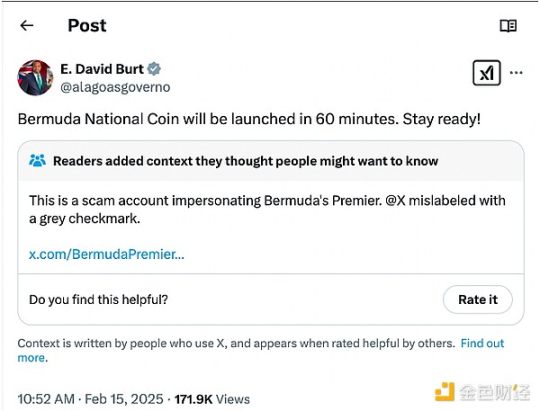
Scammers quickly added community notes to the post promoting "Bermuda National Coin." Source: Deleted Burt fake account
Despite X's delayed action, the BERMUDA Pump.fun token never attracted many investors. Trading history shows that only two buyers sold the token within minutes, including the creator of the memecoin.
February 17—"Official" Saudi Arabian Memecoin KSA
The X account of the annual Saudi Legal Conference was hacked by scammers and altered to impersonate Saudi Crown Prince Mohammed bin Salman to promote the "official" Saudi Arabian memecoin KSA.
On February 17, KSA was promoted in the name of the Crown Prince, riding on the momentum of Milei's LIBRA. However, given that KSA was not promoted through official government channels and the project did not share appropriate support and tokenomics, it was not hard to suspect it was a scam.
Of course, it was even more obvious that KSA was launched by a random developer on Pump.fun, who had only two followers.
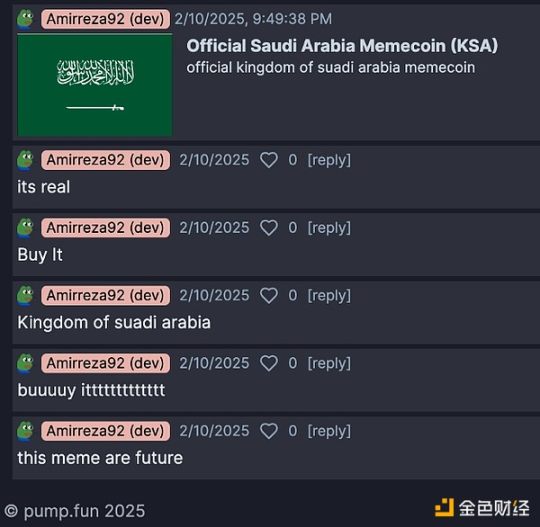
"Buuuuy ittttttttttt," urged the developer of the "official Saudi Arabian" meme coin Amirreza92. Source: Pump.fun
KSA failed to gain much traction, accumulating only $7,489 in market cap before the public became aware.
Is the Memecoin Craze Coming to an End?
In addition to the four politicians mentioned above, Malaysia's longest-serving Prime Minister has also been involved in a cryptocurrency scam on X. Former Prime Minister Mahathir Mohamad's X account was temporarily hacked on February 5 to promote a Malaysian token on Pump.fun.
Just a day after Trump launched, the Cuban government's X account was also hacked to promote Cuba.
Since the U.S. President joined this trend, it marks at least five leaders involved in the memecoin farce. But countless celebrities—including "Breaking Bad" star Dean Norris—have found themselves in similar trouble.
According to Solscan, the memecoin craze is slowing down. Whether it will revive is another matter, but at least for now, investor fatigue seems to be setting in.
免责声明:本文章仅代表作者个人观点,不代表本平台的立场和观点。本文章仅供信息分享,不构成对任何人的任何投资建议。用户与作者之间的任何争议,与本平台无关。如网页中刊载的文章或图片涉及侵权,请提供相关的权利证明和身份证明发送邮件到support@aicoin.com,本平台相关工作人员将会进行核查。




